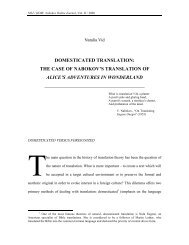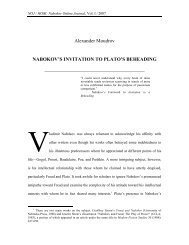Create successful ePaper yourself
Turn your PDF publications into a flip-book with our unique Google optimized e-Paper software.
Nabokov Online Journal, Vol. V (2011)<br />
_______________________________________________________________________<br />
at liberation of his readers, who in the original text are supposed to follow the author in<br />
awe and marvel at his magic.<br />
In order to accomplish this overthrow, Pera defends bad taste, reinterpreting the<br />
lack of aesthetic discernment as a pathway to truth, which for its part is here<br />
reconceptualized as not an affirmation of particular values, but the absence of pretense to<br />
having values. In Pera’s work, aesthetic refinement equals deception; her characters are<br />
divided into truthful, that is, unpretentious and unrefined, and those with pretensions to<br />
good taste. While in Lolita, Charlotte Haze could be read as yet another double of<br />
Humbert, especially in her propensity to write confessional letters, Nabokov’s novel<br />
upholds a distance between them. It is by eliciting the recognition that her suburban-<br />
housewife tastes, which Humbert abhors, are not that far from the tastes of the self-<br />
proclaimed aesthete that Nabokov’s text deflates its protagonist’s would-be aesthetic<br />
superiority. Pera’s book reduces to naught the difference between Humbert’s aestheticism<br />
and Lo’s mother’s pseudo-refinement (an imitation of societal conventions); for both,<br />
refinement and good taste become the window-dressing behind which they hide their<br />
revolting habits from others and, most significantly, from themselves. In several instances<br />
Pera’s Lo directly compares Humbert to her mother, whom she calls Plasticmom,<br />
specifically referencing their shared disinclination to distinguish between truth and<br />
falsehood (136, 149). Lo’s truth lies in the absolute rejection of refinement and good taste<br />
and, along with them, any claim to moral values; for example, Lo’s disillusionment arises<br />
not because her parent insists on being her lover, but because her lover unromantically<br />
demands to be acknowledged as her parent.<br />
One of the most telling moments in this respect is Pera’s explanation for the<br />
episode in Lolita, much analyzed by critics, of the eponymous heroine’s crying. In<br />
Nabokov’s novel, Lolita’s nightly sobs, which her stepfather chooses to ignore,<br />
compromise Humbert’s claims to superior vision and devotion to aesthetic harmony:<br />
We had been everywhere. We had really seen nothing. And I catch myself<br />
thinking today that our long journey had only defiled with a sinuous trail<br />
of slime the lovely, trustful, dreamy, enormous country that by then, in<br />
retrospect, was no more to us than a collection of dog-eared maps, ruined<br />
17

















